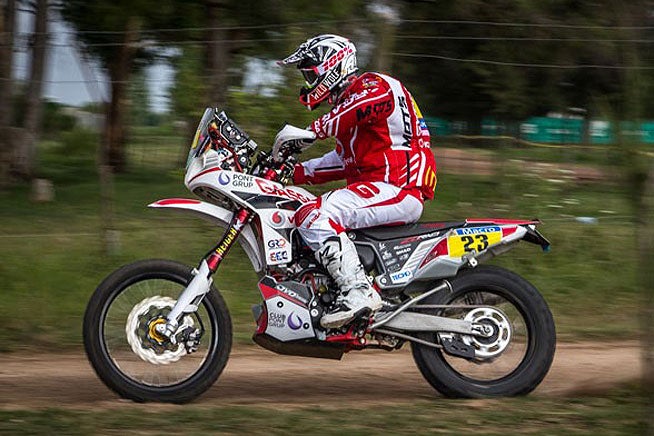Although it failed to card a finish in the Dakar Rally, the Gas Gas factory rally team remains positive about the future of its EC 450 Raid motorcycle.

The Gas Gas Pont Grup Seguros rally team is keeping its chin up after a grueling 2015 Dakar Rally in which its factory backed riders failed to see the finish line in Buenos Aires, Argentina, last Saturday.
Despite the withdrawals of team riders Dani Oliveras and Gerard Farrés, the team is confident that it has obtained valuable data that will assist them in the development of the Gas Gas EC 450 Raid, which it debuted this year. Despite the teething problems, Gas Gas says that the EC 450 Raid represents a strong foundation for the future.
Gas Gas’ woes began early in the 2015 Dakar Rally when Oliveras crashed during Stage Two and suffered a fractured right hand. Oliveras was forced to miss the start of the third stage because of the pain, ending his chances of improving upon the 36th-place finish he earned in the 2014 Dakar Rally.
“The truth is that, having finished my first participation in the Dakar in 2014, being out of this after having completed only two stages has been a real shame,” Oliveras said. “The fall was not too hard, but I broke the fourth metacarpal in my right hand, and unfortunately, I could not go on and had to withdraw. A pity, I repeat, because we had worked hard throughout the year with the whole team to be here. You cannot imagine the effort and sacrifice all that implies. I finished the second stage as I could. I did not want to throw in the towel, but the pain made me see the reality, I really could not continue like that. This week they operated on my hand, everything went well and, in a few weeks, I hope to start training and preparing for the next Dakar, to be higher, because this is what we deserve.”
Farrés overcame the problems arising from a complicated and difficult first week of the rally to reach the rest day, and he appeared set to take on the first marathon stage with gusto. However, the wet and corrosive conditions that prevailed on the salt flat of Uyuni in Bolivia, spelled the end of the rally for Farrés and 15 other motorcycle competitors. Exposed to the weather and with obvious signs of hypothermia, the Gas Gas rider was forced to hit the red button on his Iritrack, a sign of permanent abandonment and activation of an alert to the Emergency medical teams.
“In this 2015 Dakar edition we arrived with a totally new bike that premiered in Buenos Aires and, although we would have liked more time to test it, for us it was very important to be in Dakar and submit this new bike to all the demands of the toughest race on the planet,” Farrés said. “It is natural to expect problems, but they were solved, and we have gained valuable information or development, since we were subjected to temperatures of over 45 degrees under a high speed and have solved all the problems that have arisen. And finally, when all seemed well, and [after] having my best stage, came the controversial decision to start at the Salar de Uyuni. The bikes ended up destroyed by salt. Not just ours, there were a lot. We were forced to retire and it certainly shortened our progression in the rally, in which we had aimed to finish.”
Even so, Gas Gas says that the 2015 Dakar Rally was a positive learning experience. Participation in the event has been, without doubt, the best testing ground for a bike that has shown to have a good base and whose development will result in a competitive machine for the next Dakar rally, the team says.
Team manager Joan Font said, however, that the team is not satisfied with its results by any means.
“We expected more, but it was a complicated edition and we should stick with the positive part and the work of our team,” Font said. “We have coped with all of the adversities that have arisen day by day, and for all of them, we have provided solutions and improvements that will allow us to evolve our Gas Gas EC 450 Raid. In the future we look with optimism, because our bike has a good base, competitively, it just needs polishing. I wanted to take this opportunity to thank our major sponsors: Vodafone, Pont Grup Seguros and Braktec, and all our collaborators for their support and technical assistance to realize this project. The Dakar 2015 has been possible thanks to them. And finally, I also want to thank the whole team of Gas Gas both racing and the factory for the effort you have made, and a special mention for our riders, Dani Oliveras and Gerard Farrés, for their professionalism and dedication before, during, and after the Dakar Argentina-Bolivia-Chile. We look forward to the new challenges and excitement of Dakar 2016.”
 Your Privacy Choices
Your Privacy Choices